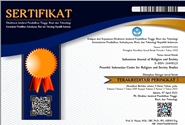Konflik Kepemimpinan Jamaah Tabligh Di Kota Padang, Sumatera Barat
Abstract
Keywords
Full Text:
PDFReferences
Galtung, J. (2003). Studi Perdamian: Perdamian dan Konflik Pembangunan dan Peradaban, terj Asnawi dan Safruddin,. Surabaya: Surabaya: Eureka.
Gati, G. N. P. B. (2014). Dinamika dan Faktor Pendorong Keberlanjutan Konflik Antara Masyarakat Tuareg dengan Pemerintahan Mali (1962-2012). Jurnal Analisis Hubungan Internasional, 3(3).
Junaedi, D. (2013). Memahami Teks, Melahirkan Konteks: Menelisik Interpretasi Ideologis Jamaah Tabligh. Journal of Qur’an and Hadith Studies, 2(1), 1–17. https://doi.org/10.1548/quhas.v2i1.1274
Kamaruddin, S. A. (2010). Jamaah Tabligh. Jakarta: Gaung Persada Press.
Konsel, M. (2017). Seberkas cahaya dari nizamuddin.
Miall, H. (2002). Resolusi Damai Konflik Kontemporer Menyelesaikan, Mencegah, Mengelola, dan Mengubah Konflik bersumber Politik, Sosial, Agama dan Ras, terj Tri Budhi Sastrio,. Jakarta: Jakarta: RajaGrafindo Persada.
Miles, M. B., & Huberman, A. M. (1992). Analisis Data Kualitatif: Buku Sumber Tentang Metode-Metode Baru. Jakarta.: UI Press.
Musyawarah ahli syuro dan para jumidar. (2018). Mudzakarah Enam Sifat Sahabat. Jakarta: Assalam.
Saepuloh, U. (2014). Model Komunikasi Dakwah Jamaah Tabligh. Ilmu Dakwah: Academic Journal for Homiletic Studies, 4(14), 657–688.
Sugiyono. (2019). Metode Penelitian Kualitatif Kuantitatif. Bandung: Alfabeta.
Syeirazi, M. K. (2019). Jamaah Tabligh Salafi Van India.
Tholhah. (2015). Perkembangan jamaah tabligh di wilayah yogyakarta. Prosiding Interdisciplinary Postgraduate Student Conference 1st Program Pascasarjana Universitas Muhammadiyah Yogyakarta (PPs UMY), 12–17.
Umdatul Hasanah. (2014). Keberadaan Kelompok Jamaah Tabligh dan Reaksi Masyarakat (Perspektif Teori Penyebaran Informasi dan Pengaruh). Indo-Islamika, 4(1), 21–40.
Wirawan, I. B. (2012). Teori-Teori Sosial dalam tiga paradigma fakta sosial, definisi sosial dan perilaku sosial,. Jakarta: Jakarta: Kencana Prenada Media Group.
Witrianto. (2015). Perkembangan Jamaah Tabligh di Kota Padang”, Ilmu sejarah Universitas Andalas Padang. Ilmu Sejarah Universitas Andalas Padang, 10–14.
Yusuf, M. (2015). Prinsip Ikram Al-Muslim Gerakan Dakwah Jamaah Tabligh dalam Membangun Masyarakat Religius di Temboro Magetan. Islamica: Jurnal Studi Keislaman, 10(2), 300–301. https://doi.org/10.15642/islamica.2016.10.2.299-324
DOI: https://doi.org/10.36256/ijrs.v2i1.85
Refbacks
- There are currently no refbacks.
Copyright (c) 2020 Indonesian Journal of Religion and Society

This work is licensed under a Creative Commons Attribution-NonCommercial 4.0 International License.
Indonesian Journal of Religion and Society (IJRS) Is Indexed By:

Indonesian Journal of Religion and Society (IJRS) is distribute under Creative Commons Attribution-NonCommercial 4.0 International License.













